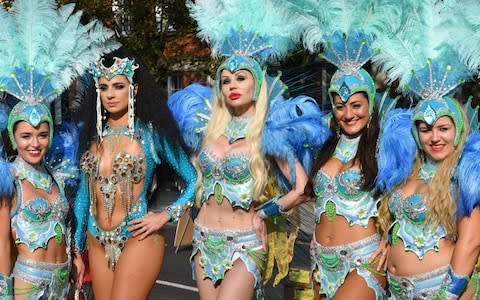Remembering Claudia Jones, pioneer of the Notting Hill Carnival

To celebrate 100 years since British women were given the right to vote, The Telegraph - alongside the Mayor of London's #BehindEveryGreatCityCampaign - is running a weekly series.
'Hidden Credits' will look back and celebrate individual women who have smashed glass ceilings, helped change society for the better and given the UK's capital something to boast about.
Born in 1915, Trinidadian Claudia Jones spent her life fighting for tolerance and equality - a road that would lead her to become an instrumental part of setting up the beloved annual Notting Hill Carnival. Devoted to improving the lives of women, she moved to New York as a child, with her interest in politics and race discrimination flourishing amid the hubbub of Harlem, where she joined the National Association for the Advancement of Colored People (NAACP) and later the American Communist Party.
During her 30 years in the States, Jones was vocal in her belief that that peace couldn’t be obtained if women, especially poor women, were excluded from the conversation. In her struggle for freedom, she often found herself on the wrong side of the law; in the height of the McCarthy era in 1955, Jones was arrested and declared un-American, and deported to Britain as she was a "subject of the British Empire".
She arrived to a country in flux, with widespread post-War immigration and racial tension rife. Swathes of West Indians—part of the Windrush generation that settled in the UK after World War II—were met by "No blacks, no dogs, no Irish," posters and other vicious anti-immigrant rhetoric. Jones soon made it her mission to protect and campaign on behalf of the Caribbean community.

Many of these newcomers were adrift, separated from their homeland and cultural history. Jones wanted to engage them, believing that "people without a voice were lambs to the slaughter". So she founded the West Indian Gazette, Britain’s very first major black newspaper; it became a symbol for resistance, and a mouthpiece for London’s then 100,000-strong Caribbean community.
Further tension rose in the capital when Oswald Mosley’s White Defence League and racist gangs began attacking London’s black community. Rioting filled the streets of Notting Hill in the summer of 1958, lasting for five nights over the bank holiday weekend.
This violence, in both London and Nottingham, galvanised the black community at large, with Jones committing to tackling racial hatred through an unconventional approach: dance. “A people’s art is the genesis of their freedom,” she believed.

A showcase for the best of Afro Caribbean talent, the carnival’s first ever iteration took place indoors on January 30, 1959, at St Pancras Town Hall and was televised by the BBC. Claudia’s Caribbean Carnival,which ran for six years, was the perfect musical antidote for a community still reeling from the unrest of earlier years.
The early days of Carnival were comparatively low key, initially staged in local town halls and community centres, and gradually swelling in popularity to the thousands who now attend. Jones’s ambition was simple: to celebrate West Indian Culture, and involve all Londoners in the festivities.

Jones’s campaigning didn’t stop when the initial excitement over the festival subsided. In later years, she protested against the 1962 Commonwealth Immigration Act, which restricted the immigration of those coming to Britain from Commonwealth countries. And although she died aged just 49, in 1964, her legacy of championing the rights of immigrants and women has lived on.
At her funeral in 1965, the African-American actor and singer Paul Robeson said: “It was a great privilege” to have known the "vigorous and courageous leader” who had been so instrumental in seeking dignity and racial justice for London’s black community.


